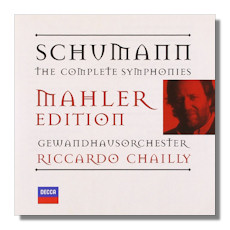
The Internet's Premier Classical Music Source
Related Links
- Schumann Reviews
- Latest Reviews
- More Reviews
-
By Composer
-
Collections
DVD & Blu-ray
Books
Concert Reviews
Articles/Interviews
Software
Audio
Search Amazon
Recommended Links
Site News
 CD Review
CD Review
Robert Schumann

Mahler Orchestrations
- Symphony #1 "Spring" in B Flat Major, Op. 38
- Symphony #2 in C Major, Op. 61
- Symphony #3 "Rhenish" in E Flat Major, Op. 97
- Symphony #4 in D minor, Op. 120
Gewandhaus Orchestra/Riccardo Chailly
Decca Classics 4780037 2CDs 120:15
If you already bought Decca 4758352 that contained Symphonies #2 and #4, and keep looking for the single disc to complete the set, don't. That disc was never created, and so this two-fer is your only option if you wish for all four symphonies. The single disc was reviewed here, and very favorably in 2007, while the complete set was not well received at all (2009) within these pages. If you have read either of those reviews (or indeed, the top of this page) you'll see that the primary selling point is the conductor's use of Gustav Mahler's editions of the scores. To my ears, Schumann has never sounded better.
Mahler's editions do not make radical changes to the scores, but if you know the works well, you'll hear changes from the opening horn calls of the Spring Symphony. Aside from the original pitches being restored, you'll find tremendous sectional clarity throughout. Mahler, who championed and admired Schumann, correctly identified that the heavy textures and somewhat clumsy dynamics were at fault in these pieces. Schumann was certainly one of the great composers, and given an intimate setting to work with, his music has no equal. In larger forms, his work is more variable, although some of that falls on conductors.
So Mahler, both a great composer and conductor, adjusts accordingly. Ironically, the creator of the centuries' most massive and controversial symphonic canon chose to de-clutter these scores and make them more chamber-like. The new editions are bright, effervescent, and respond ideally to energetic tempos and crisp playing. Whether it's the opening of the famous Rhenish or the formerly lurching Scherzo in the Spring, everything emerges anew. You get the feeling that, had Schumann's work with orchestra not caused him such consternation and distress, that this is akin to how this music would have turned out.
But I said before, Schumann's symphonic works demand excellence from the podium. A merely good performance of Beethoven's Symphony #5 will still get a standing ovation, but a mediocre performance of a Schumann symphony will send everyone to sleep. Chailly has – unsurprisingly – recorded these works before for Decca, and hardly anyone ever mentions them. Thankfully, these renditions embody the best qualities of a successful Schumann performance. They thrill, the playing is exemplary, and the generally quick tempos add – rather than detract – from the overall project.
As for comparisons, the performances resemble Szell in terms of their intensity and balances, but simply sound better. The original review on Classical Net mentioned Giulini and Furtwängler as more compelling Schumann. Yes and #Should you believe Schumann thrives only on a traditional "Germanic" approach, you may not care for this set. Should you appreciate the work of David Zinman and the lighter "period-influenced" school, or should you simply be open-minded, this will likely prove eye-opening. With any composer, multiple approaches are welcome, and essential. The old-fashioned feel of a Giulini performance is just as majestic and heartfelt as the day it hit the shelves as an LP. Klemperer is heavier still, but much beloved. These readings are compelling in their own right, a tribute to two great composers and their love of the symphony. I urge you to give this a chance.
Copyright © 2014, Brian Wigman




















